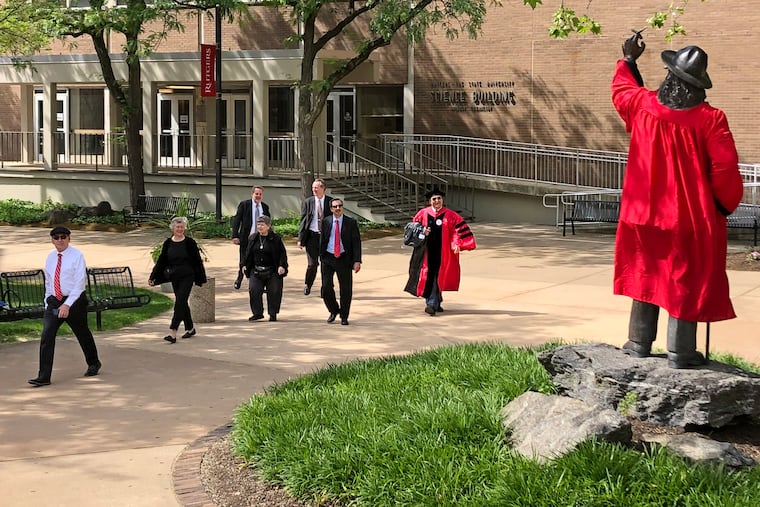Go to college for free — yes, free — at these Pa. and N.J. schools
And a UPenn professor created a database tracking free colleges around the country.

With all the talk of mounting college debt, it’s worthwhile highlighting some free schools — yes, free — available to residents of Pennsylvania and New Jersey.
We were helped along by a project created by professor Laura Perna at the University of Pennsylvania’s Graduate School of Education. It’s called the “College Promise” project, which helps consumers track free and highly subsidized college around the U.S.
The full database shows which cities and states offer residents of those cities and states low-cost education.
In addition, we investigated some local free programs:
Rutgers University offers Rutgers Future Scholars, a program that provides full tuition scholarships to 200 low-income students from New Brunswick, Piscataway, Newark, and Camden; they start in a preparation program in eighth grade.
Rutgers-Camden also started a Bridging the Gap program that offers a grant to cover up to 100 percent of tuition and fees for students from households that earn $60,000 or less a year. Families that earn $60,001 to $80,000 can receive a grant covering 75 percent of tuition, and those earning up to $100,000 a year can receive a grant covering 50 percent of tuition.
Bridging the Gap covers remaining costs after any other need-based federal and state aid have been applied, based on family adjusted gross income:
$60,000 or less: Receive a grant covering 100 percent of tuition and the general campus fee.
$60,001 to $80,000: Receive a grant covering 75 percent of remaining tuition and the general campus fee.
$80,001 to $100,000: Receive a grant covering 50 percent of remaining tuition and the general campus fee.
New Jersey City University: It offers the NJCU Debt-Free Promise Program designed to make college education accessible and affordable for New Jersey residents pursuing their undergraduate degree as incoming full-time freshman students.
Starting in fall 2016, all New Jersey residents admitted to NJCU from high school, with a family household income of $60,000 or less, were offered a scholarship in lieu of having to take out a loan (after federal and state financial aid is awarded).
To apply for the NJCU Debt-Free Promise Program, students must be admitted and submit the Free Application for Federal Student Aid (FAFSA). Students remain qualified for the program each year, if they submit a FAFSA, are in good academic standing, and register for 15 credits each semester.
Community College of Philadelphia-Its 50th Anniversary Scholars Program enables Philadelphia high school 2019 graduates to pursue an associate degree at CCP at no cost for tuition and fees, on a last dollar basis, meaning after available public funding is counted. Applicants must fill out the FAFSA form, among other requirements, to determine eligibility.
Williamson College of the Trades: Founded in 1888, Williamson, near Media, provides a full scholarship (tuition, room, board, and books) to all of its students. The program gives preference to young men from financially disadvantaged backgrounds and targets students from Philadelphia County and its neighboring counties.
University of the Sciences: The USciences Opportunity Scholarship is for eligible Philadelphia high school students who otherwise might not afford a university degree. Eligible students must be Philadelphia residents, and preference may be given to those in the immediate vicinity of USciences’ campus in the 19104, 19139, 19143, 19145, and 19146 zip codes.
After federal and state grant funding has been awarded, the USciences Opportunity Scholarship will cover 100 percent of the remaining tuition and general fee for the first four years of your program of study. It does not cover room and board and other fees.
The Tax Map
For an idea of just how complicated it is to file and appeal taxes, the National Taxpayer Advocate, an independent organization within the IRS, last week issued “the Map."
The map illustrates, at a high level, the stages of a taxpayer’s tortured journey, from getting answers to tax law questions, all the way through audits, appeals, collection, and litigation.
It shows the complexity of tax administration, with its connections and overlaps and repetitions between stages. "As you can see from its numerous twists and turns, the road to compliance isn’t always easy to navigate,” the Taxpayer Advocate Service wrote on its website.
The map is a project of the Taxpayer Advocate Service and was the parting gift of Nina Olson, the soon-to-be departing head of the office.
CPAs around Philadelphia both love and hate the Tax Map.
“We get frustrated with the IRS as we deal with our clients’ tax notices and trying to get to the proper IRS employees to resolve the issue,” said one accountant.
“It is valuable but sadly shows why taxation is so complicated,” said Jane Scaccetti, cofounder of the Drucker & Scaccetti tax accounting firm.
“The next time a client asks, ‘Isn’t this a simple call to the IRS?’, we may share the map," she said. "In fact, we are planning to frame it.”
It’s such a complex process, it was too hard for us to reproduce. But you can find it here: https://taxpayeradvocate.irs.gov/news.